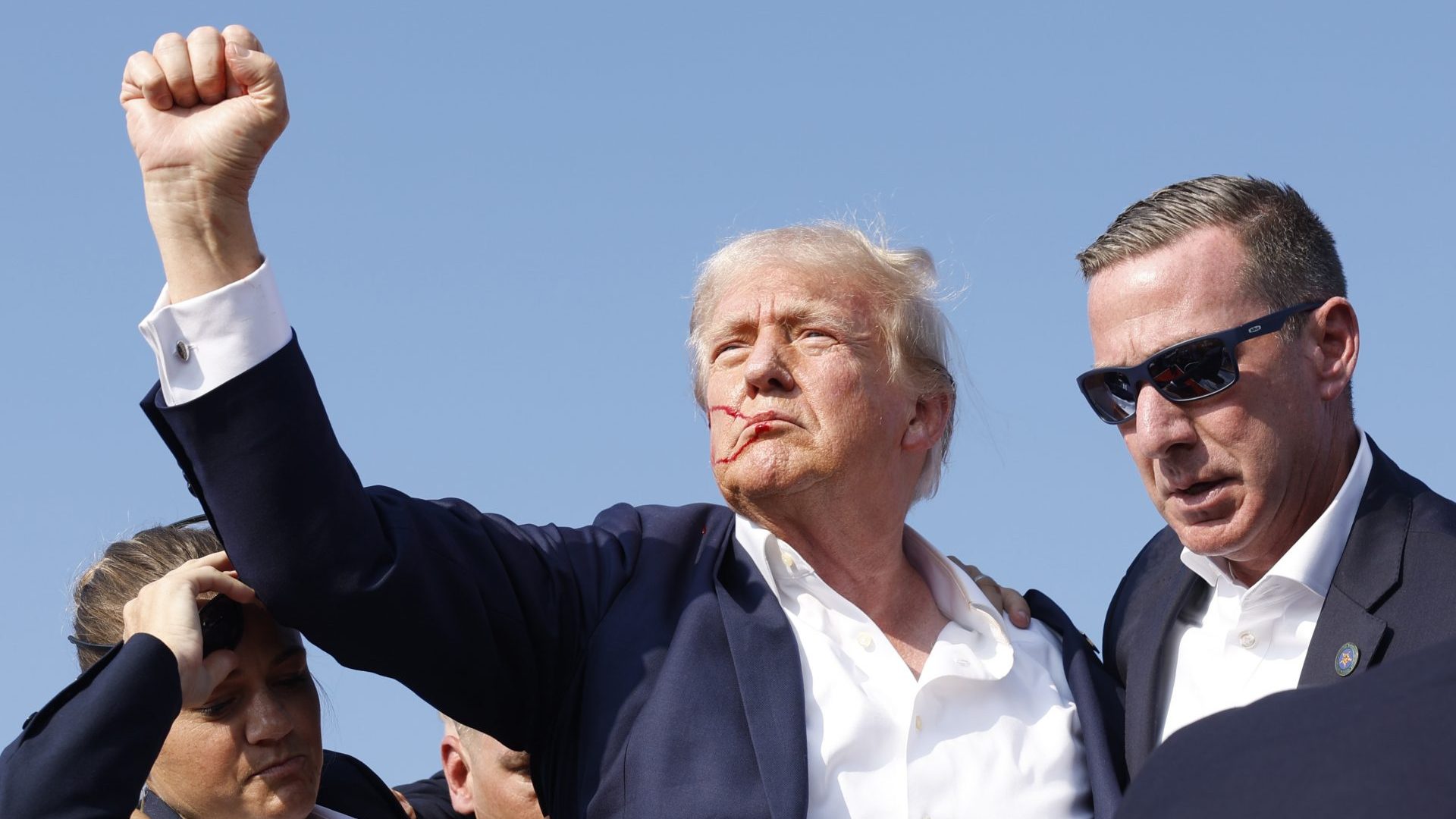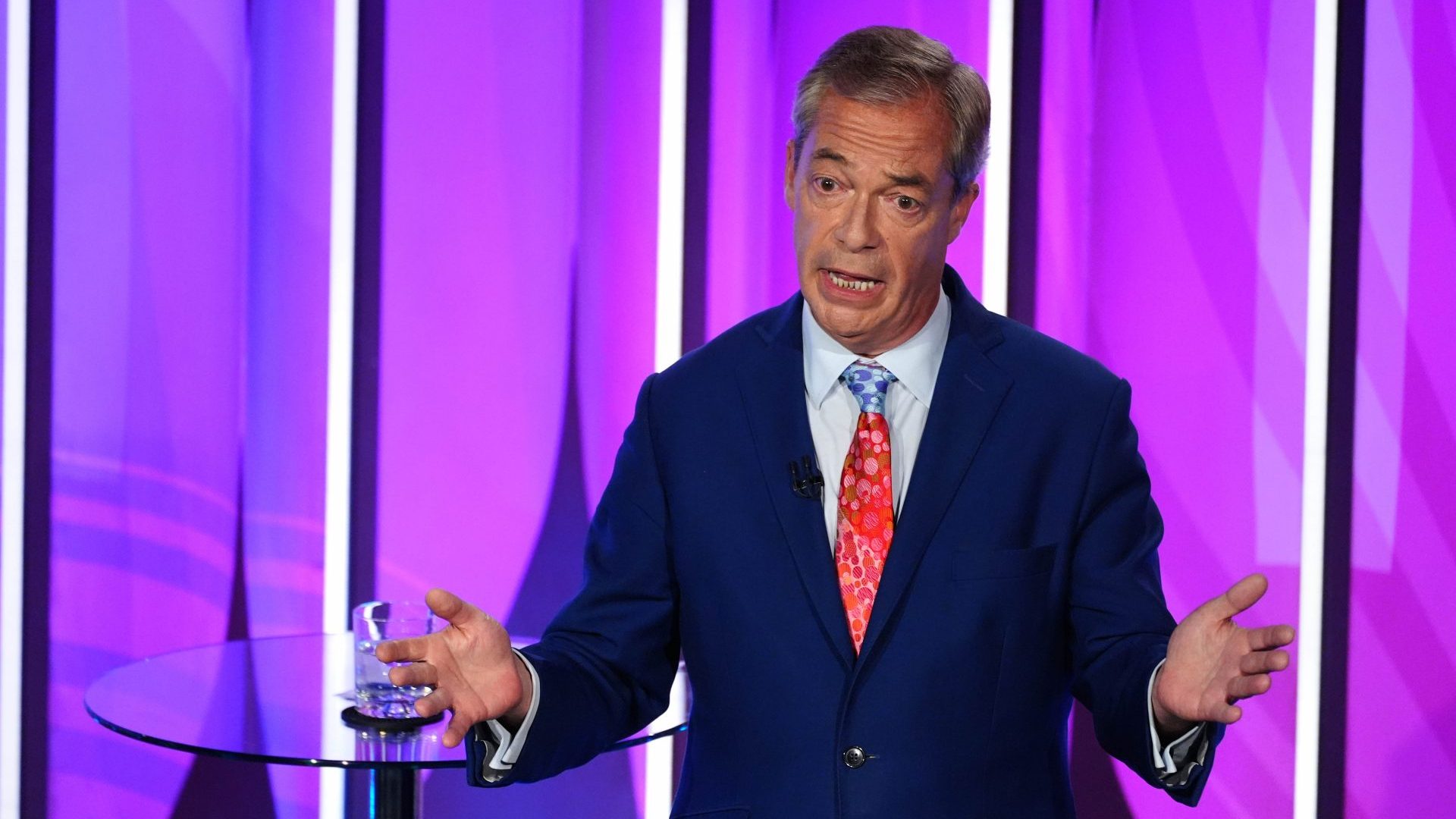The bullet hit Donald Trump, but it killed Joe Biden. Politically, that is.
What happened in Butler, Pennsylvania on Saturday evening has completely transformed a presidential contest that was already heavy with drama, hubris and narrative twists. There are more than three months to go until polling day, but this was the moment when the fates made their decisive intervention.
Watch again the clip of the former president realising that he has been wounded, hitting the deck, and disappearing under an instant shield of dark jackets. Trump is all instinct – and his instinct told him instantly that there was another shot to be taken: the instantly iconic photo that would scorch around the planet in seconds and define what had just happened.
In a remarkable show of strength for a 78-year-old who can scarcely be called athletic, he broke free momentarily of his secret service detail, and raised his fist to the air in defiance. Evan Vucci of AP took the picture, with the US flag in the background: half MAGA, half Iwo Jima.
The crowd began chanting: “USA! USA!” Trump looked like he had been expecting this moment for years. He looked like he was thinking: You won’t put me down.
On CNN, a shell-shocked panel, chaired by Wolf Blitzer, judged the moment badly by turning too quickly to the theme of “very violent people on both sides”. Yes, there is a searching debate to be had on the broader issue of political violence in the US, and who is to blame. But not, perhaps, in the first hours after the attempted assassination of a former president, in which another attendee at the rally, retired fire chief Corey Comperatore, had been killed.
Meanwhile, some of Trump’s supporters disgraced themselves by blaming Joe Biden directly for the shooting or even, in the case of Mike Collins, congressman for Georgia, calling preposterously for the district attorney in Butler County to “file charges against [the president] for inciting an assassination”.
In fact, the politics of this shocking attack are much more primal than such undignified point-scoring suggests. Since Biden’s disastrous debate performance on June 27, his team has been desperately hoping that the spotlight would swing back on to Trump. It has done so, in spectacular fashion. But it is not the former president’s criminality, or lies, or autocratic plans that are back under scrutiny. It is his resilience, mettle and – credit where it is due – physical courage that are consuming the bandwidth of popular attention.
Trump has long claimed to be the victim of political persecution; and now they – whoever “they” are – have tried to kill him.
Within an hour and a half of the shooting, T-shirts bearing Vucci’s picture of the wounded president, fist raised, were being sold online. History has no predetermined direction, but – at such moments – it can be an unstoppable juggernaut.
To understand why this moment is so consequential, one has to grasp the particular role of virility and masculinity in American political culture. As Bill Clinton has observed: “Strong and wrong generally beats weak and right”.
Presidential races, in particular, are ruthlessly patriarchal and Darwinian (ask Hillary Clinton). And this has always been central to Trump’s appeal to his electoral base.
As Kristin Kobes Du Mez observes in Jesus and John Wayne (2020): “His testosterone-fueled masculinity aligned remarkably well with that long championed by conservative evangelicals. What makes for a strong leader? A virile (white) man…an aggressive and even reckless masculinity was precisely what was needed when dealing with the enemy”.
This primitive notion of the indestructible leader, deeply embedded in American frontier culture, is the real backdrop to Biden’s misfortunes since his debate faceplant. In any democratic country, such a performance – impaired, frail, cognitively confused – would have been a disaster. In the particular context of US politics, it was an absolute catastrophe.
On Sunday, as Republicans gathered for their convention in Milwaukee, Wisconsin, the president addressed the nation from the Oval Office with composure and dignity, insisting that “politics should never be a political battlefield or, God forbid, a killing field”.
Nobody decent could dissent from that sentiment. But Biden’s speech prompted two reflections.
First, that it will take an extraordinary effort of collective good will to lower the political temperature and prevent further violence in this election cycle.
Second: the sickening events of Saturday evening cannot be permitted to stifle the normal operations of democracy, or to terrorise the American polity into selective silence.
It is perfectly possible to be appalled by the attempt on Trump’s life and appalled by what he plans to do if re-elected. And what he plans to do is not a matter of conjecture but of record: he has been quite explicit that he intends to lead the US in a xenophobic, misogynistic, autocratic direction.
For a start, he proposes the largest deportation of undocumented immigrants in US history; not just at the border but removing individuals and families from their homes all over the country. “When I return to the White House, we will stop the plunder, rape, slaughter, and destruction of the American suburbs, cities and towns,” he told a Michigan rally in May.
He has been open, too, about his intention to invoke the Insurrection Act, to deploy troops against protesters and to send the National Guard into cities afflicted by serious crime. He has said that shoplifters should be shot and that his political enemies should be prosecuted. He intends to replace thousands of federal employees with MAGA loyalists. On July 1, the Supreme Court’s ruling on presidential immunity offered Trump, if re-elected, an astonishing degree of freedom to do what he wants without legal consequence.
As one White House veteran put it to me recently: “It is clear that he would try to provoke disturbances that would enable him to impose emergency measures – and then keep them in place. It’s the standard playbook of the budding tyrant”.
The probability of his return to the White House is not just a matter of domestic concern. It affects the whole world.
A second Trump presidency would wreck Ukraine’s chances of defeating Russia; imperil Nato; significantly damage the international effort to combat climate change; lead to trade tariffs that would have global economic consequences; and reassure every autocratic regime on earth that it could ignore the international rules-based order, confident that the strongman in the Oval Office is interested only in transactions rather than universal rights.
Now, more than ever, all this matters. Trump may well prove to be electorally unstoppable. But the one man who might still conceivably reduce the chance of that awful outcome is Biden.
The irony, of course, is that the president has completely misdiagnosed his role in this election. Buoyed by his victory against Trump in 2020 and success in keeping the “red wave” at bay in the 2022 mid-terms, he has ditched his original promise to be the “bridge” to a younger generation and persuaded himself that he is, once again, the only person that can beat the Republican nominee.
This race was meant to be a referendum on Trump, his character and his fitness for office. An insurrectionist, twice impeached, convicted of 34 felony counts, found liable for sexual assault by jury: how could such a person possibly be running, let alone ahead in the polls?
In February, special counsel Robert Hur’s report on Biden’s allegedly unauthorised storage of classified documents, described him as “a sympathetic, well-meaning, elderly man with a poor memory” – and therefore unfit to be prosecuted. It was his own team that suggested the earliest ever presidential debate, their intention being to settle once and for all the question of his alleged infirmity.
The debate in Atlanta had precisely the opposite effect, confirming in 90 agonising minutes the long-held conviction of the American people that Biden is no shape to serve a second term. Whoever wins on November 5 must be ready to occupy the most powerful office on earth until January 20, 2029. Nobody who watched the incumbent’s performance could honestly conclude that he has the slightest chance of clearing that bar.
Since then, Biden and his supporters have merely compounded the damage. His 22-minute interview with ABC’s George Stephanopoulos on July 5 was a sad portrait in delusion and denial. On the following Monday he phoned in to MSNBC’s Morning Joe to rant about the “elites” trying to depose him. But it’s the elites that have been protecting him.
At last week’s Nato summit, he was supposedly going to defy physiological gravity and amaze the world with his return to vigorous lucidity. And – of course – this is not what happened.
It really isn’t good enough to say that his answers on Sino-Russian relations were well-informed; or – reverting to the debate – that everyone has the occasional “bad night”. That’s doubtless true. But in some jobs – airline pilots, vascular surgeons, US presidents – you aren’t allowed bad nights.
In which context: the assassination attempt has already been widely misinterpreted as marking a shift away from the question of Biden’s viability as a candidate – when it does no such thing. Indeed, it makes the contrast between the two men seem starker than ever.
Trump’s new aura of invincibility should embolden Democratic members of Congress and senators to call for the president to make way for a new nominee. At the time of writing, 19 have done so. But, in reality, only one person can take the necessary action, and that is Biden himself.
There are no good options left to the president. There is still time – just – for him to step aside, either to endorse Harris, or (preferably), to call for a “blitz primary” to allow others to enter the race such as Gretchen Whitmer, governor of Michigan, Josh Shapiro, her counterpart in Pennsylvania, Gavin Newsom of California and Pete Buttigieg, the Transportation Secretary.
Such a spree of eleventh-hour campaigning might energise the paralysed Democratic Party. It might be mayhem, too, making life even easier for Trump. It is the very definition of a Hail Mary pass. But so too is sticking with Biden. Inaction is a choice.
The incumbent is a great politician whose time is past. Trump is a force of nature, a mythological manifestation of the American id. In the modern world, a fireball of kinetic energy will always beat a statue.
The “shot heard round the world” is how Ralph Waldo Emerson described the salvo that launched the American revolutionary war in 1775. Two and half centuries on, another such shot has been heard; and Trump’s supporters promise a “second American Revolution,” which will remain bloodless “if the left allows it to be”.
It is a chilling prospect. But – as things stand – the wounded man with his fist in the air is defying reason yet again, tearing up what remains of the rulebook, and heading back to the White House.




